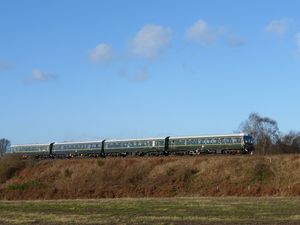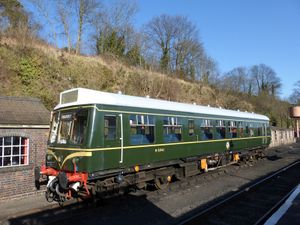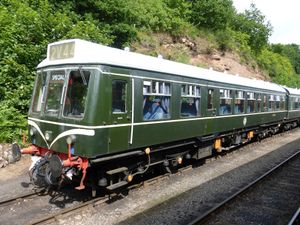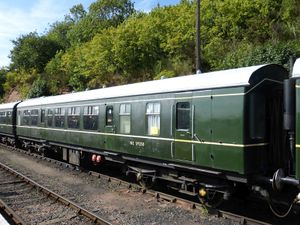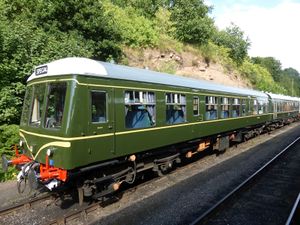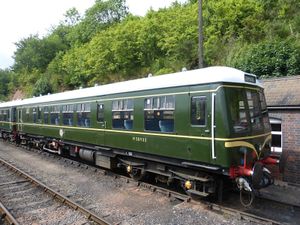The DMU Group (West Midlands)
"for the benefit of the community, to advance education and learning by preserving, restoring, maintaining and operating vintage diesel single and/or multiple unit passenger rail vehicles on a suitable heritage railway or railways" [1].
It is a member of The Railcar Association.
Contents
Contents
History
The DMU Group came about following a meeting organised by Locomotive Inspector John Price in the King & Castle on 9 February 1989.
The Group was originally interested in preserving BR Class 104 vehicles made by the Birmingham Railway Carriage and Wagon Co at Smethwick. However investigation revealed these vehicles were insulated with white asbestos, leading the Group to opt for the Derby-built lightweight Class 108 units instead. BR never allocated the Class 108 to the Severn Valley in service, but the vehicles would be suitable for tourist operation, having relatively comfortable passenger layout and good visibility.
Initially SVR ‘traditionalists’ expressed concerns at the introduction of relatively modern DMUs on what they perceived to be first and foremost a preserved steam railway. The Railway therefore agreed to a two year trial, with the DMU to be used for special charters and evening scenic cruises.
The first 2 powered cars, Driving Motor Brake Second M51941 and Driving Motor Composite M52064, arrived under their own power at Kidderminster on 29 March 1991. They were formally commissioned and handed over to the Group on 13 October of that year.
The charters and scenic cruises quickly proved popular, and in June 1992 the Group purchased unpowered centre car M59250. This entered service in November 1992, making the DMU a 3-car unit including buffet facilities. 1993 saw the introduction of the Saturday evening ‘fish & chips’ rail cruises.
The popularity of the buffet led to a demand for more formal catering. Initially this comprised a full dining service of 8 covers in the first class saloon of M52064, cooked in a kitchen measuring four by three feet!
In June 1992 the Group had purchased powered car M51935 as a source of spares for the 2-car unit. However it was soon converted into a catering vehicle, with a full size kitchen in the brake compartment, a bar lounge in the smaller passenger compartment and seating for 20 diners in the larger passenger compartment. Between 1993 and 1996 the DMU ran as a rather unconventional 4-car unit including 3 powered cars.
In autumn 1996 the Group acquired its final car, unpowered Driving Trailer Composite 56208, giving an additional 65 seats capacity. With 5 operational cars the Group was then in a position to operate two different sets depending on seasonal demand, at that time unique in preservation. Although formal dining ended in 1999, the traditional summer evening cruises with bar and buffet continued until the 2020 coronavirus disease (COVID-19) pandemic.
M51935 was extensively damaged by fire in May 2008 in what was believed to be an arson attack. The Group acquired powered car M50933/53933 as a replacement. 51935 was transported off site and completely dismantled. A significant number of components, including body panels, were able to be recovered for use elsewhere.
Sources
- SVR News Issue 131, DMU Group (West Midlands) Progress, Trevor Daw
- SVR News
- DMU Group (West Midlands) website
See also
References
- ↑ DMU Group (West Midlands) on the Charities Commission website (Retrieved 26 June 2023)
